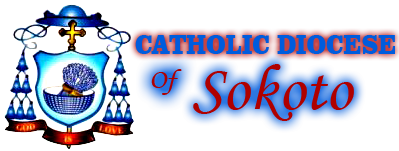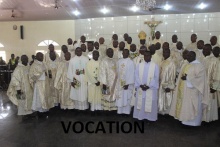The reality lived by many in our dear country today causes us to reflect deeply on the true meaning of Christmas and the beauty of the gift God has given to us, which is Christ himself. Our reality in Nigeria today is such that the notion of jingle bells and Santa Claus and tinsel are no more than an empty distraction, and even that is far from the grasp of most. At a time when our people are marooned in little oceans of pain and living in the most degrading of circumstances as strangers in their own country, when their lives hover precariously on the brink of death, when in almost every sense their lives have become both nasty and brutish, the celebration of Christ’s birth among us evokes a sense of sobriety.
Today, I want to apply another metaphor to our celebration, drawn from a sad event which happened on Christmas day, five years ago, namely, the bombing of St. Theresa’s Catholic Church, Madalla. Today, I call attention to this tragedy because it speaks to the essence of Christianity and lays a foundation for a deeper understanding of what Christians celebrate when we commemorate the birth of our Lord and Saviour Jesus Christ.
It is natural that the idea of God becoming one like us, being truly human and still also truly God, would generate doubt, cynicism and be seen even as scandal and heresy. Even Mary the Mother of Jesus could not at first fathom how what the angel told her could be possible. She said: How can this be since I am a Virgin (Lk. 1:34). Confused, Joseph, her proposed husband decided to divorce her quietly and this was because he was a man of honour (Mt. 1:19). It was merely an act of blind obedience to the will of God, not progress in human knowledge, that enabled our blessed Mother to say to the angel, Thy will be done (Lk. 1:38).
God, as revealed through Christ and loved by his followers, remains a God of contradictions, impossible to fully comprehend or rationalize in human terms. It is to the nature of these contradictions that I wish to speak in this Christmas Message. In a plural society such as ours, with competing and contending claims and notions of faith and community, it is important that we Christians continuously grow in our knowledge and love of God as we contemplate and reflect on the meaning of our faith.
It is important that we consider how and why Christ entered the world the way He did. He did not come with claims of having been called. He came in fulfillment of a prophesy that was made thousands of years earlier. Isaiah prophesied: A virgin shall conceive and bear a son and he shall be called, Emmanuel (Is. 7:14). When Joseph is confused, the angel reminds him of this same prophesy and adds that this child will take away the sins of his people (Mt. 1:23). Some thirty years later, as he began His ministry, Jesus presented his letter of credential: The Spirit of the Lord is upon me, He has chosen me to bring good news to the poor (Lk. 4:18). When John the Baptist sighted him, he said: Behold the lamb of God, behold him to who takes away the sins of the world (Jn.1:29).
Why did He enter human history in such a lowly, human state, surrounded by poverty and squalor? Why was he born in a manger, in such humiliation, and not in a palace? One way to look at this would be to see it simply as the fulfillment of Scripture because the prophet Micah had already prophesied that He would be born in Bethlehem thousands of years before this happened (Micah 5:2).
The message we can take from this is that total submission to the will of God is a key ingredient of our faith. Jesus laid out the example when he said: The father and I are one (Jn. 10:30). He further said: I have come to do the will of my father (Jn. 6:38). True Christians must seek to align with the will of God.
There are indeed many other messages to be taken from this humble birth of Jesus. Firstly, being born in the manger conveys to us that God is accessible. Moses had already told the people about the nearness of God through His word when he said: The word of God is not in heaven that you should say, who will go up and get it for us? The word of God is near you. It is in your heart and in your mouth (Dt. 30:12). The incarnation, the Word of God made flesh in Jesus of Nazareth, marks the fulfillment of that promise. We do not need to pass through an army of guards to see Him, we do not need to have ‘connections’, because God has no favourites (Acts 10:30, Rm. 2:11).
Secondly, the birth in a manger where animals live and feed suggests to us that Jesus indeed is the bread of life that has come down from heaven and this bread is for everyone. He will be food for our souls with power to save us (Jas. 1:21). Jesus assures us that anyone who eats this bread will never be hungry and they will live forever (Jn. 6:51). Isaiah had already prophesied that in His kingdom food and drink are free (Is. 55:1). This free giving, this gratuitousness is a hallmark of the Christian faith, reminding all believers that our faith is not a cult, a cloister of solidarity where we live only for ourselves and our fellow members of this cult. No; our faith tells us to share with all people, including everyone of whatever creed or colour or gender or class, without exclusion. Thus, we call God Our father (Lk. 11:2), meaning the Father of all people, not the father of Christians because, He allows His sun to shine on the just and the unjust, the rain to fall on both the good and the bad (Mt. 5: 45).
Thirdly, the birth of Jesus in such humble surroundings speaks of God’s preferential choice for the poor and marginalized in society and also reminds us that God finds us wherever we are. When Jesus is born, the first people to hear the news are not the wealthy and the powerful, those living in palaces, those with the power over life and death. Rather, the first to hear the news were shepherds who were out in the fields taking care of their flocks in the cold winter night (Lk. 2: 8). The simplicity of the shepherds and the seeming accidental nature of this momentous encounter tell us that in the end, it is God who finds us out of His love and generosity.
As we reflect on this in our reality in Nigeria today, there are many lessons for us to think about.
The murderers who struck at St. Theresa’s Catholic Church fired the first shot in a battle that would rage on and nearly bring our nation to its heels. Hundreds of Churches would later be wiped out or razed to the ground and hundreds of thousands of Christians killed, maimed and driven from their homes by a murderous gang whose initial mission seemed to target the foundations of the Christian faith. Today, we all know how far we have travelled as this violence would later swallow everyone in its wake, Muslims and Christians alike. What is important and relevant to us is how people of faith, particularly Christians, have responded to these attacks.
Undoubtedly and sadly some Christians resorted to violence. However for the most part, in the spirit of our faith, Christians across Nigeria should stand erect and hold up their heads high. Despite all the trials and tribulations, they have largely heeded the words of Jesus: When these things begin to happen, stand tall and do not be afraid because your liberation is near at hand (Lk. 21: 28). Amidst these trials and tribulations, Christians have tried to stand by the Gospel, true to the injunctions of our Lord and Saviour Jesus Christ. We have been tempted to take up the guns to fight back, we have been tempted to say we have had enough, we have been tempted to re-write the sacred texts that abhor violence. But, despite all this, most of us have heeded the words of Jesus who said: You have heard it said: Love your neighbour and hate your enemy. But I tell you, love your enemies and pray for those who persecute you (Mt. 5:44). It has been daunting and challenging, but we should feel proud of what we have accomplished together especially in the area of co-operation and solidarity, in respect of the noble ideals of our common humanity.
I saw in Yola individuals and Churches that threw their doors open to all who sought shelter irrespective of faith or social status. The Catholic Diocese of Yola, under the leadership of Bishop Stephen Mamza, was the epicentre for the distribution of foodstuffs to families from all the spectrums of life, Muslims and Christians alike. Along with other Christian denominations, they have borne tremendous witness to the faith. I recall a woman saying to me: I used to say I have not seen God. But now, through our father (a man who had opened his doors to over 20 people he did not know), and the Catholic Bishop of the Diocese of Yola, I know what God is. It was touching indeed because this is the Gospel in real life. The American University, under the leadership of the indefatigable Professor Margee Ensign, has just received an international award for the tremendous work it has done in Adamawa. As we celebrate Christmas this year, and remember the sad events of 2011, may we resolve to live the Gospel more faithfully and thus be instruments through whom God is present today in the world, in our country and in our society.
Today, from the debris of St. Theresa’s Catholic Church, Madalla, five new Catholic Churches have sprung up and they are thriving under the Parish. They are, St. John the Beloved, Rafin Sanyi, St Thomas, Paulosa, St Fabian Dakwa, Holy Trinity, Kwankwashi, St. Charles, Sabon Wuse, all on their way to being new Parishes in future. This is the history of Christianity and we continue to pray for them and those loved ones they left behind.
It was the great Tertulian who said that the blood of martyrs is the seed of Christianity. Yes, the blood of the 46 martyrs who lie just outside the Church have indeed watered the faith. This has always been the ironic history of Christianity. This is why Christians must remain relentless in upholding the principles of peace and witnessing that has held us together for over 2000 years.
Therefore, as we mark Christmas, Christians must renew their resolve to live the Gospel and thus build a society that bears the hallmarks of the Christian faith: Faith, Hope and Love to all. I wish you all a blessed and peaceful Christmas celebration. We pray that through God’s help and our own sincere efforts, 2017 will be a year of peace and prosperity for our country and our world.

